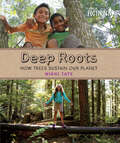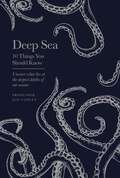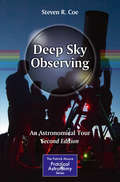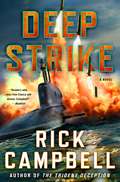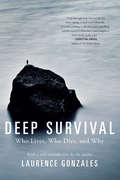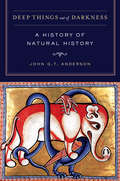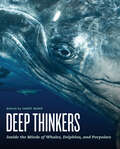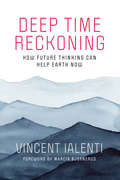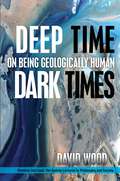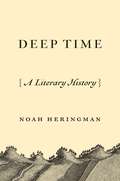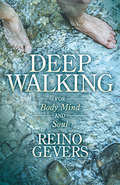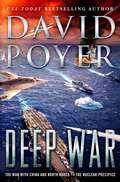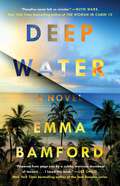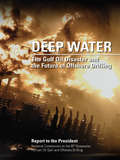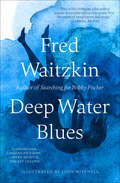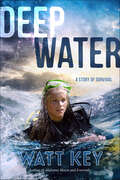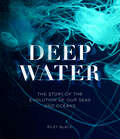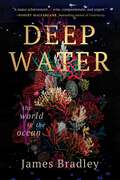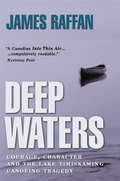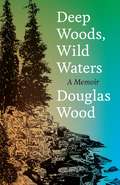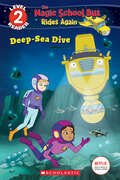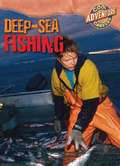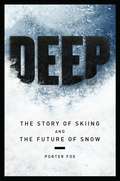- Table View
- List View
Deep Roots: How Trees Sustain Our Planet (Orca Footprints #8)
by Nikki TateMost of us see trees every day, and too often we take them for granted. Trees provide us with everything from food, fuel and shelter to oxygen and filtered water. Deep Roots celebrates the central role trees play in our lives, no matter where we live. Each chapter in Deep Roots focuses on a basic element—water, air, fire and earth—and explores the many ways in which we need trees to keep our planet healthy and livable. From making rain to producing fruit to feeding fish, trees play an integral role in maintaining vibrant ecosystems all over the world. Facts about trees and hands-on activities throughout help readers discover ways to get to know our giant neighbors better.
Deep Sea: 10 Things You Should Know
by Jon CopleyUncover what lies at the deepest depths of our oceans...In ten brief and informative essays, marine biologist and TV science advisor Professor Jon Copley journeys to one of the most mysterious and fascinating environments on Earth, the deep sea. Discover what makes this unique habitat such a challenging environment, the creatures that call it home and how ocean explorers are able to utilise the latest technology to aid their research and travel miles below the ocean surface.The Deep Sea: 10 things you should know is a brilliant guide to one of the most fascinating and curious places known to humankind.
Deep Sky Observing
by Steven R. CoeThis updated second edition has all of the information needed for your successful forays into deep sky observing. Coe uses his years of experience to give detailed practical advice about how to find the best observing site, how to make the most of the time spent there, and what equipment and instruments to take along. There are comprehensive lists of deep sky objects of all kinds, along with Steve's own observations describing how they look through telescopes with apertures ranging from 4 inches to 36 inches (0. 1 - 0. 9 meters). Binocular observing also gets its due, while the lists of objects have been amended to highlight only the best targets. A new index makes finding targets easier than ever before, while the selection of viewing targets has been revised from the first edition. Most of all, this book is all about how to enjoy astronomy. The author's enthusiasm and sense of wonder shine through every page as he invites you along on a tour of some of the most beautiful and fascinating sites in the deep sky, with the improved object list making sure your choice of a faint cluster, hazy nebula or distant galaxy will all be equally rewarding.
Deep Strike: A Novel (Trident Deception Series #6)
by Rick CampbellIn Rick Campbell's next action-packed thriller Deep Strike, the U.S. Atlantic fleet is in a race to stop a rogue Russian submarine—funded by ISIS—en route to launch a missile attack against the east coast of the U.S.A shoulder-launched missile attack on a convoy of vehicles leaving the U.N. headquarters in New York kills several diplomats, including the American ambassador. Security footage reveals that the killer behind the attack is a disgraced former special forces operative, Mark Alperi. But before U.S. intelligence operatives can catch up with him, Alperi is already onto the next phase of his plan.With funding from the nearly shattered ISIS, Alperi plans an attack on the U.S. that will be more devastating than 9/11. He bribes a desperate Russian submarine commander with access to an expensive experimental drug for his daughter who is suffering from a rare disease. In exchange, the Russian commander will take his submarine to the Atlantic Ocean and launch a salvo of missiles at various targets along the East Coast of the United States. The commander lies to his crew that it's a secret mission, with dummy missiles, for a training exercise. At the same time, unbeknownst to the commander, Alperi has arranged for four of the missile warheads to be replaced with four surplus nuclear warheads and arms them. When the Russian submarine sinks the U.S. sub that is tracking it, the U.S. military is alarmed. When Intelligence uncovers Alperi's plot, though, it becomes a race against time—find the Russian sub and sink it before it can launch a devastating nuclear attack.
Deep Survival: Who Lives, Who Dies, And Why
by Laurence Gonzales"Unique among survival books... stunning... enthralling. Deep Survival makes compelling, and chilling, reading."--Penelope Purdy, Denver Post In ?Deep Survival?, Laurence Gonzalez combines hard science and powerful storytelling to illustrate the mysteries of survival, whether in the wilderness or in meeting any of life's great challenges. This gripping narrative, the first book to describe the art and science of survival, will change the way you see the world. Everyone has a mountain to climb. Everyone has a wilderness inside.
Deep Things out of Darkness
by John G. AndersonNatural history, the deliberate observation of the environment, is arguably the oldest science. From purely practical beginnings as a way of finding food and shelter, natural history evolved into the holistic, systematic study of plants, animals, and the landscape. Deep Things out of Darkness chronicles the rise, decline, and ultimate revival of natural history within the realms of science and public discourse. Ecologist John G. T. Anderson focuses his account on the lives and contributions of an eclectic group of men and women, from John Ray, John Muir, Charles Darwin, and Rachel Carson, who endured remarkable hardships and privations in order to learn more about their surroundings. Written in an engaging narrative style and with an extensive bibliography of primary sources, the book charts the journey of the naturalist's endeavor from prehistory to the present, underscoring the need for natural history in an era of dynamic environmental change.
Deep Thinkers: Inside the Minds of Whales, Dolphins, and Porpoises
by Janet MannHumans aside, dolphins, whales, and porpoises are often considered to be the smartest creatures on Earth. Science and nature buffs are drawn to stories of their use of tools, their self-recognition, their beautiful and complex songs, and their intricate societies. But how do we know what we know, and what does it mean? In Deep Thinkers, renowned cetacean biologist Janet Mann gathers a gam of the world’s leading whale and dolphin researchers—including Luke Rendell, Hal Whitehead, and many more—to illuminate these vital questions, exploring the astounding capacities of cetacean brains. Diving into our current understanding of and dynamic research on dolphin and whale cognition, communication, and culture, Deep Thinkers reveals how incredibly sophisticated these mammals are—and how much we can learn about other animal minds by studying cetacean behavior. Through a combination of fascinating text and more than 150 beautiful and informative illustrations, chapters compare the intelligence markers of cetaceans with those of birds, bats, and primates, asking how we might properly define intelligence in nonhumans. As all-encompassing and profound as the seas in which these deep cetacean cultures have evolved, Deep Thinkers is an awesome and inspiring journey into the fathoms—a reminder of what we gain through their close study, and of what we lose when the great minds of the sea disappear.
Deep Time Reckoning: How Future Thinking Can Help Earth Now (One Planet)
by Vincent IalentiA guide to long-term thinking: how to envision the far future of Earth.We live on a planet careening toward environmental collapse that will be largely brought about by our own actions. And yet we struggle to grasp the scale of the crisis, barely able to imagine the effects of climate change just ten years from now, let alone the multi-millennial timescales of Earth's past and future life span. In this book, Vincent Ialenti offers a guide for envisioning the planet's far future--to become, as he terms it, more skilled deep time reckoners. The challenge, he says, is to learn to inhabit a longer now.
Deep Time, Dark Times: On Being Geologically Human (Thinking Out Loud)
by David WoodThe new geological epoch we call the Anthropocene is not just a scientific classification. It marks a radical transformation in the background conditions of life on Earth, one taken for granted by much of who we are and what we hope for. Never before has a species possessed both a geological-scale grasp of the history of the Earth and a sober understanding of its own likely fate. Our situation forces us to confront questions both philosophical and of real practical urgency. We need to rethink who “we” are, what agency means today, how to deal with the passions stirred by our circumstances, whether our manner of dwelling on Earth is open to change, and, ultimately, “What is to be done?” Our future, that of our species, and of all the fellow travelers on the planet depend on it.The real-world consequences of climate change bring new significance to some very traditional philosophical questions about reason, agency, responsibility, community, and man’s place in nature. The focus is shifting from imagining and promoting the “good life” to the survival of the species. Deep Time, Dark Times challenges us to reimagine ourselves as a species, taking on a geological consciousness. Drawing promiscuously on the work of Nietzsche, Heidegger, Foucault, Derrida, Deleuze, and other contemporary French thinkers, as well as the science of climate change, David Wood reflects on the historical series of displacements and de-centerings of both the privilege of the Earth, and of the human, from Copernicus through Darwin and Freud to the declaration of the age of the Anthropocene. He argues for the need to develop a new temporal phronesis and to radically rethink who “we” are in respect to solidarity with other humans, and responsibility for the nonhuman stakeholders with which we share the planet. In these brief, lively chapters, Wood poses a range of questions centered on our individual and collective political agency. Might not human exceptionalism be reborn as a sort of hyperbolic responsibility rather than privilege?
Deep Time: A Literary History
by Noah HeringmanHow the concept of “deep time” began as a metaphor used by philosophers, poets, and naturalists in the eighteenth and nineteenth centuriesIn this interdisciplinary book, Noah Heringman argues that the concept of “deep time”—most often associated with geological epochs—began as a metaphorical language used by philosophers, poets, and naturalists of the eighteenth and nineteenth centuries to explore the origins of life beyond the written record. Their ideas about “the abyss of time” created a way to think about the prehistoric before it was possible to assign dates to the fossil record. Heringman, examining stories about the deep past by visionary thinkers ranging from William Blake to Charles Darwin, challenges the conventional wisdom that the idea of deep time came forth fully formed from the modern science of geology. Instead, he argues, it has a rich imaginative history.Heringman considers Johann Reinhold Forster and Georg Forster, naturalists on James Cook’s second voyage around the world, who, inspired by encounters with Pacific islanders, connected the scale of geological time to human origins and cultural evolution; Georges-Louis Leclerc, Comte de Buffon, who drew on travel narrative, antiquarian works, and his own fieldwork to lay out the first modern geological timescale; Blake and Johann Gottfried Herder, who used the language of fossils and artifacts to promote ancient ballads and “prehistoric song”; and Darwin’s exploration of the reciprocal effects of geological and human time. Deep time, Heringman shows, has figural and imaginative dimensions beyond its geological meaning.
Deep Walking: For Body, Mind and Soul
by Reino GeversHow to train yourself to be conscious and aware so that any walk anywhere can become a journey of self-development and spiritual renewal.In following the footsteps of medieval pilgrims on ancient paths, countless modern-day seekers have rediscovered purpose and meaning. Reino Gevers reveals why deep walking is one of the best and most underrated forms of exercise, boosting the quality of life on many levels. In taking time out for mindful walking, senses are opened to the whispers of the universe, realigning body and mind in a world of distraction. Religion and spirituality take on a whole new meaning. Within Deep Walking, Reino tells the stories of pilgrims “walking off” old emotional baggage. The shadow is part of the walking-alone-experience that gradually cracks open the doorway to the soul. The emotional shift becomes part of the deep walking experience.
Deep War: The War with China--The Nuclear Precipice (Dan Lenson Novels #18)
by David PoyerThe war against China turns dire, as the United States struggles to survive in this gripping thriller featuring Navy commander Dan LensonAfter the United States suffers a devastating nuclear attack, and facing food shortages, power outages, cyber and AI assaults, and a wrecked economy, Admiral Dan Lenson leads an allied force assigned to turn the tide of war in the Pacific, using precisely targeted missiles and high-tech weapons systems. But as the campaign begins, the entire Allied military and defense network is compromised—even controlled—by Jade Emperor, a powerful Chinese artificial intelligence system that seems to anticipate and counter every move. While Dan strives to salvage the battle plan, his wife Blair helps coordinate strategy in Washington, DC, Marine sergeant Hector Ramos fights in an invasion of Taiwan, and Navy SEAL master chief Teddy Oberg begins a desperate journey into central China on a mission that may be the only way to save the United States from destruction and defeat.Thrilling, filled with near-future technology, and deeply grounded in the human cost of war, David Poyer's Deep War is a brilliant novel by an acknowledged master of military fiction.
Deep Water
by Emma BamfordThe dark side of paradise is exposed when a terrified couple reveals their daunting experience on a remote island to their rescuers—only to realize they&’re still in the grips of the island&’s secrets—in this intense and startling debut in the tradition of Into the Jungle and The Ruins. When a Navy vessel comes across a yacht in distress in the middle of the vast Indian Ocean, Captain Danial Tengku orders his ship to rush to its aid. On board the yacht is a British couple: a horribly injured man, Jake, and his traumatized wife, Virginie, who breathlessly confesses, &“It&’s all my fault. I killed them.&” Trembling with fear, she reveals their shocking story to Danial. Months earlier, the couple had spent all their savings on a yacht, full of excitement for exploring the high seas and exotic lands together. They start at the busy harbors of Malaysia and, through word of mouth, Jake and Virginie learn about a tiny, isolated island full of unspoiled beaches. When they arrive, they discover they are not the only visitors and quickly become entangled with a motley crew of expat sailors. Soon, Jake and Virginie&’s adventurous dream turns into a terrifying nightmare. Now, it&’s up to Danial to determine just how much truth there is in Virginie&’s alarming tale. But when his crew make a shocking discovery, he realizes that if he doesn&’t act soon, they could all fall under the dark spell of the island.
Deep Water
by National Commission on the BP Deepwater Horizon Oil Spill Offshore DrillingOn April 20, 2010, the Macondo well blew out, costing the lives of 11 men, and beginning a catastrophe that sank theDeepwater Horizondrilling rig and spilled nearly 5 million barrels of crude oil into the Gulf of Mexico. The spill disrupted an entire region’s economy, damaged fisheries and critical habitats, and brought vividly to light the risks of deepwater drilling for oil and gas—the latest frontier in the national energy supply. Soon after, President Barack Obama appointed a seven-member Commission to investigate the disaster, analyze its causes and effects, and recommend the actions necessary to minimize such risks in the future. The Commission’s report offers the American public and policymakers alike the fullest account available of what happened in the Gulf and why, and proposes actions—changes in company behavior, reform of government oversight, and investments in research and technology—required as industry moves forward to meet the nation’s energy needs.
Deep Water Blues
by Fred WaitzkinInspired by a true story, artfully told by the author of Searching for Bobby Fischer: A Bahamian island becomes a battleground for a savage private war. Charismatic expat Bobby Little built his own funky version of paradise on the remote island of Rum Cay, a place where ambitious sport fishermen docked their yachts for fine French cuisine and crowded the bar to boast of big blue marlin catches while Bobby refilled their cognac on the house. Larger than life, Bobby was really the main attraction: a visionary entrepreneur, expert archer, reef surfer, bush pilot, master chef, seductive conversationalist. But after tragedy shatters the tranquility of Bobby&’s marina, tourists stop visiting and simmering jealousies flare among island residents. And when a cruel, different kind of self-made entrepreneur challenges Bobby for control of the docks, all hell breaks loose. As the cobalt blue Bahamian waters run red with blood, the man who made Rum Cay his home will be lucky if he gets off the island alive . . . When the Ebb Tide cruises four hundred miles southeast from Fort Lauderdale to Rum Cay, its captain finds the Bahamian island paradise he so fondly remembers drastically altered. Shoal covers the marina entrance, the beaches are deserted, and on shore there is a small cemetery with headstones overturned and bones sticking up through the sand. What happened to Bobby&’s paradise?
Deep Water: A Story of Survival
by Watt KeyFrom Watt Key, the author of the acclaimed Alabama Moon, comes a thrilling middle grade survival story about a scuba dive gone wrong and two enemies who must unite to survive.It's the most important rule of scuba diving: If you don't feel right, don't go down.So after her father falls ill, twelve-year-old Julie Sims must take over and lead two of his clients on a dive miles off the coast of Alabama while her father stays behind in the boat. When the clients, a reckless boy Julie's age and his equally foolhardy father, disregard Julie's instructions during the dive, she quickly realizes she's in over her head. And once she surfaces, things only get worse: One of the clients is in serious condition, and their dive boat has vanished—along with Julie's father, the only person who knows their whereabouts. It's only a matter of time before they die of hypothermia, unless they become shark bait first. Though Julie may not like her clients, it's up to her to save them all.
Deep Water: The Story of the Evolution of Our Seas and Oceans
by Riley BlackWhat lies beneath the surface of the ocean has mystified humankind for millennia.We have explored more of the surface of the Moon than we have of the deep sea. From vampire squid to giant spider crabs, and from hydrothermal vents to bioluminescence, its watery depths are both fascinating and terrifying.Deep Water explores, through spectacular images and expert text, how this unique habitat came into being, what lives there and why, how it has evolved and what the future will bring for this dark and mysterious environment.
Deep Water: The World in the Ocean
by James Bradley"Deep Water is a major achievement....Bradley's skills both as novelist and essayist converge here to create this wise, compassionate and urgent book, characterized throughout by a clarity of prose and a bracing moral gaze that searches water, self and reader." —ROBERT MACFARLANE, bestselling author of UnderlandIn this thrilling work—a blend of history, science, nature writing, and environmentalism—acclaimed writer James Bradley plunges into the unknown to explore the deepest recesses of the natural world.Seventy-one percent of the earth’s surface is ocean. These waters created, shaped, and continue to sustain not just human life, but all life on Planet Earth, and perhaps beyond it. They serve as the stage for our cultural history—driving human development from evolution through exploration, colonialism, and the modern era of global leisure and trade. They are also the harbingers of the future—much of life on Earth cannot survive if sea levels are too low or too high, temperatures too cold or too warm. Our oceans are vast spaces of immense wonder and beauty, and our relationship to them is innate and awe inspired.Deep Water is both a lyrically written personal meditation and an intriguing wide-ranging reported epic that reckons with our complex connection to the seas. It is a story shaped by tidal movements and deep currents, lit by the insights of philosophers, scientists, artists and other great minds. Bradley takes readers from the atomic creation of the oceans, to the wonders within, such as fish migrations guided by electromagnetic sensing. He describes the impacts of human population shifts by boat and speaks directly and uncompromisingly to the environmental catastrophe that is already impacting our lives. It is also a celebration of the ocean’s glories and the extraordinary efforts of the scientists and researchers who are unlocking its secrets. These myriad strands are woven together into a tapestry of life that captures not only our relationship with the planet, but our past, and perhaps most importantly, what lies ahead for us.A brilliant blend of Robert MacFarlane’s Underland, Susan Casey’s The Underworld, and Simon Winchester’s Pacific and The Atlantic, Deep Water taps into the essence of our planet and who we are.
Deep Waters: Courage, Character and the Lake Timiskaming Canoeing Tragedy
by James RaffanThere are few writers who can take the facts of an actual event and transform them into a compelling story that captures the mind and the heart. James Raffan is that rare author, proving with Deep Waters that he is a masterful storyteller who has not only penned a story that is by turns harrowing and poignant, but is also a powerful investigative work that sensitively explores the nature of courage, risk and loss. On the morning of June 11, 1978, 27 boys and four leaders from St. John’s School in Ontario set out on a canoeing expedition on Lake Timiskaming. By the end of the day, 12 boys and one leader were dead, with all four canoes overturned and floating aimlessly in the wind. This tragedy, which was first deemed to be an “accident,” was actually, as James Raffan explains, a shocking tale of a school’s survival philosophy gone terribly wrong, unsafe canoes and equipment, and a total lack of emergency preparedness training. Deep Waters is a remarkable story of endurance, courage and unspeakable pain, a book that also explores the nature of risk-taking and the resilience of the human spirit.
Deep Woods, Wild Waters: A Memoir
by Douglas WoodWait, young Douglas&’s grandfather says as the bobber twitches on the surface of Little Lake. Be patient. And so begins an encounter with the promise and wonder of nature that will last a lifetime. Deep Woods, Wild Waters traces the winding path that carried Douglas Wood from one wonder to the next, through a landscape of rocks, woods, and waters, with stops along the way for questions and reflections that link human nature to the larger mysteries of the natural world.Like life itself, the author&’s way is not linear. One landmark leads back to a favorite campsite, another prompts him to consider the &“gospel of rocks,&” another launches him into the wilderness beyond the stars—a contemplation of time and space and humanity&’s place in all of it. The creator of thirty-four books, including the classic Old Turtle, and an expert woodsman and wilderness canoe guide, Wood brings all his storytelling and bushwhacking skills to bear as he takes us hurtling down wild rapids, crossing stormy lakes, or simply navigating the treacherous currents and twisty trails of everyday life. A warm, generous, and knowing guide, Wood maps a journey that, as he says, &“anyone can take, through a landscape anyone can know.&” Turning the pages, hiking the portages, running the rapids, or scanning the wild country from high promontory, he invites us to say, in a soul-satisfying moment of recognition, &“I know that place.&”
Deep in the Swamp
by Brian Lies Donna M. BatemanCount from 1 otter pup to 10 baby crayfish as readers learn about the special relationships of baby and mom mammals, reptiles, birds, and insects that make their home in the Okefenokee Swamp. A helpful guide to swamp flora and fauna is included. Modeled after the song "Over in the Meadow" by Olive A. Wadsworth.
Deep-Sea Dive (Scholastic Reader, Level 2)
by Samantha BrookeSeatbelts, everyone. Next stop...under the sea in this beginning reader packed with fun science facts. Based on the NETFLIX animated series!When Dorothy Ann accidentally loses Jyoti's high-tech locket in the ocean, it's all aboard the Magic School Submarine to retrieve it! Down they go through the layers of the sea, amazed by some of Earth's most unusual animals. But when their bus loses power at the darkest depths, can the kids find inspiration from the creatures they find there to turn their luck around?
Deep-sea Fishing (Cool Adventure Careers)
by William David ThomasThe first group of titles in an ongoing series introduces students to six amazing adventure careers. Geared for reluctant readers in upper elementary school and above, each high-interest title combines easy-to-follow text with engaging on-the-job photos to spark students' interest in reading and career exploration. Each book is filled with descriptive information about the career, along with the skills and requirements needed to pursue a job in the profiled field.
Deep-sky Companions
by O’meara Stephen JamesIn this fresh list, Stephen James O'Meara presents 109 new objects for stargazers to observe. The Secret Deep list contains many exceptional objects, including a planetary nebula whose last thermal pulse produced a circumstellar shell similar to the one expected in the final days of our Sun's life; a piece of the only supernova remnant known visible to the unaided eye; the flattest galaxy known; the largest edge-on galaxy in the heavens; the brightest quasar; and the companion star to one of the first black hole candidates ever discovered. Each object is accompanied by beautiful photographs and sketches, original finder charts, visual histories and up-to-date astrophysical information to enrich the observing experience. Featuring galaxies, clusters and nebulae not covered in other Deep-Sky Companions books, this is a wonderful addition to the series and an essential guide for any deep-sky observer.
Deep: The Story of Skiing and the Future of Snow
by Porter FoxIn his stunning first book, veteran ski writer Porter Fox captures the 8,000-year-old sport of skiing, the miracle of snow and the shocking truth of how climate change could wipe out both in the next 75 years. The narrative follows the unlikely rise of skiing from prehistoric Norwegian hunters to nobility in the Alps in the 1800s to present-day freeriders on the vaunted slopes of the Rocky Mountains. On his global tour of the most celebrated mountains in the Northern Hemisphere from Washington's Cascade Range to the European Alps. Fox talks to alpinists about the allure and mysticism of the sport and to scientists about climate change and its effect on snow ultimately finding a story that is far larger than the demise of skiing.
